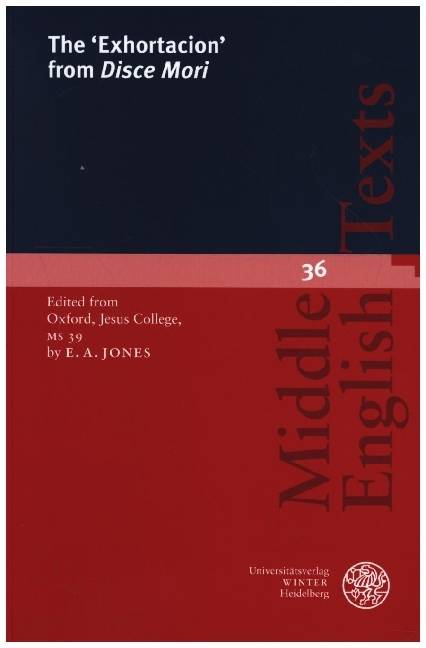
- Afhalen na 1 uur in een winkel met voorraad
- Gratis thuislevering in België vanaf € 30
- Ruim aanbod met 7 miljoen producten
- Afhalen na 1 uur in een winkel met voorraad
- Gratis thuislevering in België vanaf € 30
- Ruim aanbod met 7 miljoen producten
Zoeken
The 'exhortacion' from 'disce Mori'
Edited from Oxford, Jesus College, MS 39
€ 47,45
+ 94 punten
Omschrijving
The fifteenth-century English compilation Disce Mori begins as an almost archetypal manual of religious instruction in the tradition of the Somme Le roi/Miroir du monde. However, in its concluding part, or 'Exhortacion', it turns to the more specific concerns of its female dedicatee (probably a vowess or recluse, although the text also has some connection with Syon Abbey). In lively and well-organized prose, the compiler moves from a consideration of his reader's vow, through love of God and the experience of contemplation, before closing with a call for perseverance in the life of perfection. He includes substantial excerpts from the works of Richard Rolle and Walter Hilton, and allusions to and quotations from Chaucer's Troilus and Criseyde. This is the first edition of any significant portion of Disce Mori, and includes an introduction and notes detailing the sources of the work, and its relationship with its derivative, Ignorancia Sacerdotum.
Specificaties
Betrokkenen
- Uitgeverij:
Inhoud
- Aantal bladzijden:
- 119
- Taal:
- Engels
- Reeks:
- Reeksnummer:
- nr. 36
Eigenschappen
- Productcode (EAN):
- 9783825352042
- Verschijningsdatum:
- 5/01/2006
- Uitvoering:
- Paperback
- Formaat:
- Trade paperback (VS)
- Afmetingen:
- 154 mm x 234 mm
- Gewicht:
- 2588 g

Alleen bij Standaard Boekhandel
+ 94 punten op je klantenkaart van Standaard Boekhandel
Beoordelingen
We publiceren alleen reviews die voldoen aan de voorwaarden voor reviews. Bekijk onze voorwaarden voor reviews.










